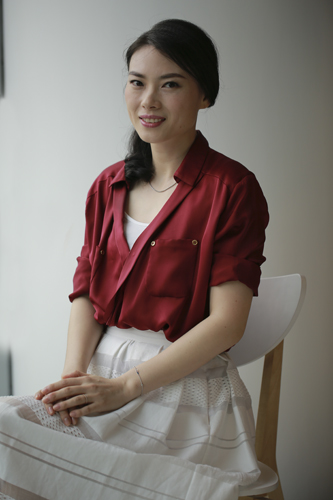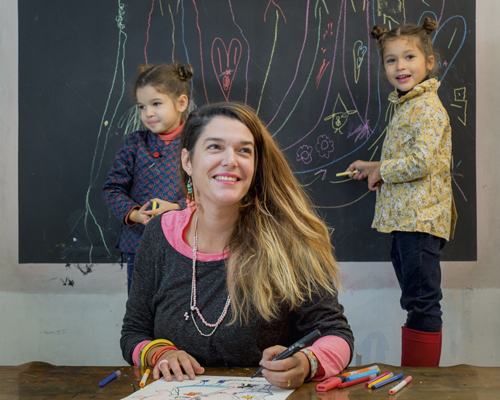
The employment market for moms can be tough. Finding a job that is satisfying, well-paid, enables you to draw on your skills and experience, and that can also be done while raising a family isn’t easy. This is why many expat women become entrepreneurs and set up their own businesses. In doing so, these moms have found ways to carve out a business niche for themselves, opening up employment opportunities that just aren’t available in the conventional job market.
Most of us at some point see an opportunity: an unsatisfied demand in the market or an existing product or service which could be improved. Entrepreneurs are the ones that actually act on these opportunities. They have self-belief that their idea and vision can be made real through hard work and the capacity to learn the lessons of the market along the way.
beijingkids spoke to three entrepreneur moms, all of whom have built successful companies. Running your own business is not easy, but these moms have managed to do so with a mix of creativity, commitment, and sheer determination.
Lyndal Halliday, Flowerley
Australian Lyndal Halliday has lived in China for five years, starting out down south in rural Guangdong and arriving in Beijing in 2013. Halliday has two kids, Leo (age 6) and May (18 months). With an undergraduate degree in social science and international relations, Halliday had a brief stint in research and lobbying, before going on to pursue a PhD in sociology. While studying she worked as both an academic and a casual florist shop assistant. She loved both. After much soul searching (and many tears!) she decided to give up her PhD. “I needed something to do while my husband was working near Guangzhou, so I completed a year-long floral design diploma in Hong Kong.” Travelling back and forth across the border, carrying giant armfuls of flowers, “I would arrive late at night in a little known town called Shilong. The locals must have thought I was some sort of crazy flower foreigner!” she laughs.
Halliday started her company Flowerley in October 2013, a small floristry studio specializing in beautiful custom bouquets delivered throughout Beijing. “I offer a highly bespoke English speaking service with a different design aesthetic than what can generally be found in Beijing,” she explains.
When Halliday first arrived in Beijing, she looked for work based on her research expertise and interests. “I was also pregnant with our second child and while I had a few good interviews, I was told I couldn’t be hired because I was on the wrong visa or that I was pregnant.” Disheartened and disappointed, she decided to take charge of her own employment and make bunches of beautiful flowers. “I built a website from scratch, had some business cards printed, and started telling people I was a florist. I didn’t feel like a florist, I still felt like a pregnant, unemployed, failed academic, and trailing spouse, but walking the talk helped me transition into a different career,” she explains.
One of the most challenging aspects of setting up Flowerley has been learning to think like an entrepreneur. “After a decade in universities I had no idea how to think for profit,” she says. Another challenge is working within the Internet restrictions in China. “My customers are generally based overseas and as such my work is heavily Google dependent.”
Working moms are constantly trying to strike that work-life balance. The priority for Halliday is first and foremost her family and so she chooses not to work full-time. “For me, I get that balance by putting my children first, being OK with saying no to customers, and working late at night,” she says. Despite being offered incredible opportunities, such as designing all the flowers for a new Mercedes-Benz launch, in reality taking on such big contracts is impossible. With a young baby around, and only her spare room to work in, such projects are just too big.
In a nod to her sociologist past, Halliday observes that in Beijing she gets to experience the random and contradictory forces of globalization in action. “It gives me a thrill to stand in the middle of this mega city, essentially engaged in a delivery job like any migrant worker, baby strapped to me, arms filled with bouquets, carrying little messages of love from far flung parts of the world. I get many a quizzical look at the front desk of large Chinese firms!” she says.
Being an entrepreneur mom, is there one thing that Halliday cannot live without? “How about five things?! My husband (and chief cheerleader), my son who tells me my flowers make everything beautiful, my ayi who lovingly looks after our youngest and keeps everything ship-shape, the Internet, and our trusty Jeep.” Halliday would like to expand into providing floral design workshops as a way of combining her past life in universities and her current life of flowers. At the moment she’s looking for a suitable venue. Watch this space!

Jennifer Jin Ma, little oasis
Jennifer Jin Ma is a Chinese national who grew up in New Zealand. She has been living in Beijing for three years and has two boys, Lucas (age 4) and Jacob (2). Ma studied Law and Commerce at University, and her professional background was in brand management, working with luxury brands in Australia and London. Ma is the founder of little oasis, which opened up in Beijing’s Parkview Green mall in June of this year. A lifestyle space catering to families with children age 0-6, the vision for little oasis is to ‘redefine family time’. The space comprises of a playground, café, lounge, classroom, golf simulator, mini-spa, and working office.
“I was inspired to start a business by my own kids, my own needs, and the needs I saw in the moms around me,” explains Ma. “The idea came about simply because my own needs weren’t being met as a mom with two little kids, and I observed that the same gap was felt by many others,” she continues.
Ma went through a number of stages before being able to propel her dream into a reality, a process that took about two years. “I did numerous round tables with potential target market groups, and then wrote a business plan to see if it was a feasible idea,” she explains. Next was research and lots of it. “It’s vital to find out as much as you can about the industry you want to get into and the different types of businesses that already exist.”
Ma wrote out the key steps she would need to follow in order for her business to come to life. The first step was to find a location, and Parkview Green mall is an impressive location to have. “That’s when I thought, this is going to work,” she says. “But I have moments like that every day, when I have a small win! But I can’t dwell on it for too long, we’re a start-up business and it will be a long journey filled with small wins and losses,” she says.
There have been many challenges along the way, not least adjusting to a new lifestyle and going from being a mom to a business woman. “This means trying to balance it all. It’s never going to be perfect and you will never please everyone. Just stay true to what you want to do.” Business-wise there’s the challenge of having to be totally present for all aspects of the business. “A start-up is like a new born baby. You are growing it for nine months inside your brain, getting it together, and then it’s born. The first few months in particular are overwhelming as its new every day, so you have to learn, adjust, and solve issues very quickly.”
Despite these challenges, setting up the business has given so much to Ma. From meeting interesting people, watching her idea come to life, and seeing people get so much value and enjoyment out of little oasis. “Running my own business means having a purpose I’m passionate about in life. But I couldn’t do it without a supportive husband and kick-ass girlfriends!”

Marianne Daquet, Atelier Art School
Hailing from France, where she grew up in the Paris suburbs, Marianne Daquet arrived in Beijing in 2006. She has two daughters ages 4 and 5. Daquet studied fine arts in school and during her studies taught art at evening classes and in the holidays. “After graduation I taught art in elementary and high school, during which time I also worked on my own art and was doing exhibitions and illustrations,” she says.
In Beijing, she first worked at the French school, training teachers. Then in 2007 installed a studio in her little hutong courtyard. “I started my first classes there,” she explains. “I was teaching weekly classes and holiday workshops, mostly for French kids.” Daquet stopped for a while when her first child was born and, when she became pregnant with her second child six months later, decided not to resume the classes.
“After the birth of my second child, I knew my life was here in Beijing and it was time to settle and build something on my own. I had this idea of continuing to give art classes, but in a new place, with more teachers and more diversity to offer to the public,” she explains. Daquet felt there was a lack of good artistic education being offered, in the different art centers and schools she visited. “I had a strong feeling that my idea for the art school was a good one, not just as a business but as a mission to improve art teaching in Beijing,” she explained.
Daquet met another woman who was interested by the project. They partnered up and opened Atelier Art School in September 2012. The business started small and quickly they had enough students who came, stayed, and told their friends. Daquet’s business partner is no longer involved, and the second branch of Atelier opened in Shunyi this year. “What was challenging for me was growing, because growing a business requires practical knowledge that I do not have. The opening of our second school was a big challenge, it still is,” she says.
There have been emotional challenges for Daquet too. They once prepared classes for Bethel, the NGO that looks after blind children. Daquet taught the first class, with another Chinese teacher, and it was very intense. “At the end of the class, the kids were so happy and they achieved beautiful things. When they left I couldn’t stop myself from crying. It reminded me why I do this job and why I created this school,” she says.
Some periods during the year are incredibly busy for Daquet, requiring her to work all day, late evenings, and weekends. “I have a wonderful team and whenever I can, I take my kids to the events. Atelier is a second home for them!” she laughs.
Our moms’ advice on setting up a business:
- Decide what you want to do, and do it. No idea is too big or too small. Write it down. Make a plan. And work on it every single day.
- Write a business plan that includes non-financial goals and priorities. This will keep you focused on all your priorities and remind you why you started a business in the first place.
- To be successful in China you need to deliver to an international standard. Work hard to give your customers better value and better products.
- Take small steps. Nothing will ever be perfect and if you wait until it’s perfect, you will never start anything.
- There will be difficult times, exhausting moments, and sometimes you’ll want to give up. But if you believe in your idea, just do it!
- Believe in yourself. Self-doubt can be a major impediment to extending yourself and taking risks.
- Being afraid can be a good thing. It means you are challenging yourself.
Photos: Courtesy of Lyndal Halliday, Jennifer Jin Ma, and Marianne Daquet



